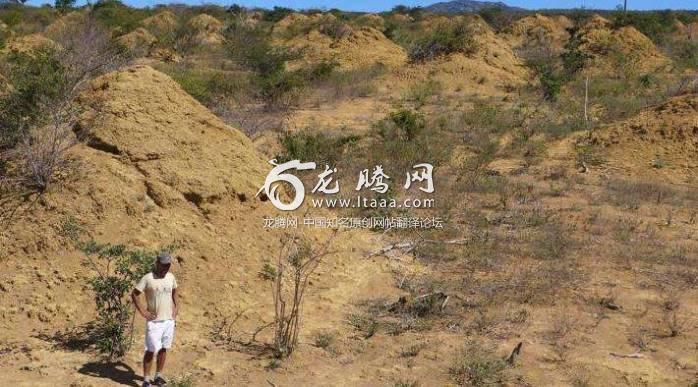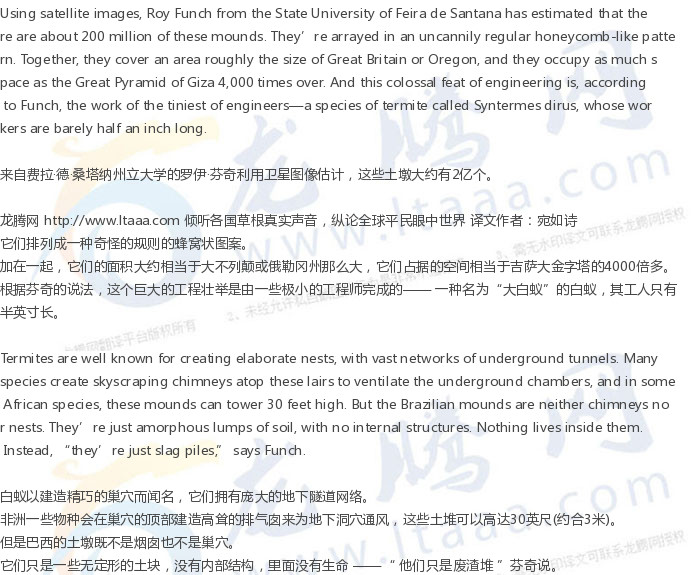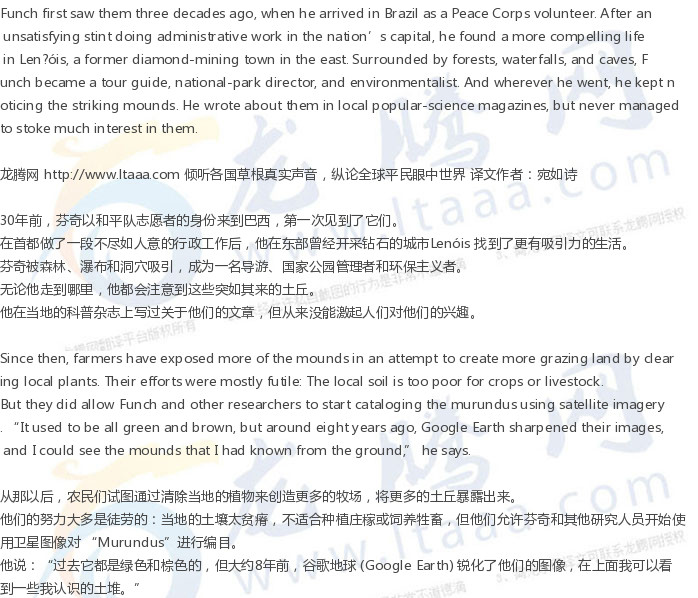4000 年来,白蚁在巴西制造了一些不可思议的东西:白蚁制造的巨大土丘覆盖了英国大小的区域,太空可见龙 [美国媒体]
在巴西东部,神秘的泥土圆锥从干燥、坚硬的土壤中升起。这些土丘的底部宽约30英尺,高6至13英尺。从地面上看,每一个土丘与周围的土丘之间有大约60英尺的杂草,很难说清楚到底有多少这样的土丘。但从太空看,它们的真实范围变得非常清晰。
For 4,000 Years, Termites Have Been Building Something Incredible in Brazil Their huge mounds cover an area the size of Britain, and are visible from space.
4000 年来,白蚁在巴西制造了一些不可思议的东西:白蚁制造的巨大土丘覆盖了英国大小的区域,太空可见
ED YONG
NOV 19, 2018
In the east of Brazil, mysterious cones of earth rise from the dry, hard-baked soil. Each of these mounds is about 30 feet wide at its base, and stands six to 13 feet tall. From the ground, with about 60 feet of overgrown land separating each mound from its neighbors, it’s hard to tell how many there are. But their true extent becomes dramatically clear from space.
在巴西东部,神秘的泥土圆锥从干燥、坚硬的土壤中升起。这些土丘的底部宽约30英尺,高6至13英尺。从地面上看,每一个土丘与周围的土丘之间有大约60英尺的杂草,很难说清楚到底有多少这样的土丘。但从太空看,它们的真实范围变得非常清晰。
The local termites create extensive subterranean labyrinths of tunnels, and they eject whatever soil they don’t need on the surface. The process is slow and gradual, but the termites have been at it for millennia. They’re more like a geological force than an organism. Just as rivers or glaciers sculpt the landscape around them, so too have these tiny insects sculpted some 90,000 square miles of Brazil into a junkyard that’s visible from space.
当地的白蚁在地下建造巨大的隧道迷宫,它们将不需要的土壤排放到地表。
这一过程是缓慢而渐进的,但白蚁在这方面已经有几千年的历史了。
它们更像是一种地质力量而不是一种有机体,就像河流或冰川塑造了周围的景观一样,这些微小的昆虫也把巴西的9万平方英里(约合9万平方英里) 的土地雕刻成了一个从太空可以看到的垃圾场。
These mounds are known as murundus, and rather confusingly, they’re different from other mounds called campos de murundus. The latter are found in the wet, savanna-like areas of southern and central Brazil instead of the dry northeast, and it’s not clear whether they’re built by termites at all. Campos de murundus have also been well studied for decades; by contrast, the northeastern murundus, though well known by locals, have been largely neglected by scientists.
这些土堆被称为“Murundus”,令人困惑的是,它们与其他被称为“Murundus”山丘的土堆不同,后者主要在巴西南部和中部潮湿、类似热带稀树草原的地区,而不是干燥的东北部,目前尚不清楚它们是否是由白蚁建造的。
相比之下,东北部的“Murundus”山丘虽然为当地人所熟知,却在很大程度上被科学家们所忽视。
The honeycomb distribution of the murundus is just one example of mysterious repeating patterns in nature. The famous fairy circles of Namibia and Australia—discs of bare red soil that pockmark miles of low grassland—are another. For years, scientists have argued about the cause of these circles. Some say they’re the work of termites. Others think they’re caused by the grasses themselves, battling for water and nutrients. Still others have argued that it’s a bit of both.
The murundus, Funch says, are likely to be much simpler in origin. “There’s no doubt,” he says, that they’re termite-made. “I’ve seen termites building the mounds with my own eyes.”
“Murundus”式的巢穴分布只是自然界神秘重复模式的一个例子。
纳米比亚和澳大利亚着名的仙女圈—— 一个光秃秃的红土圆盘——是另一个例子,它们在几英里长的低矮草原上留下了繁多的麻点。
多年来,科学家们一直在争论这些圆圈的成因,有人说是白蚁干的,另一些人认为它们是由草本身引起的,因为它们在为水和营养而战,还有一些人认为这两者都有一点。
芬奇说,“Murundus”的起源可能要简单得多。“毫无疑问,”他说,“它们是白蚁造成的。”“我亲眼见过白蚁建造这些土墩。”
By examining murundus that had been sliced open by road-construction teams and probing them using optic fibers, Funch and his colleague Stephen Martin realized that each one begins when a termite colony builds a vertical tube rising straight up from its underground nest. The tube isn’t a chimney—it’s mostly closed at the top except for small side-holes around the rim. As the termite workers excavate their nest, they chuck soil out of these holes, eventually creating a cone. “There’s no engineering involved,” says Funch. “They’re just throwing the stuff out.” The cones aren’t even used as portals to the surface world: When termites forage at night on the forest floor, they emerge through temporary tubes between the murundus that they then seal during the day.
通过检查道路建设队伍切开的“Murundus”,并使用光学纤维探测它们,芬奇和他的同事斯蒂芬 · 马丁意识到,每个土墩都始于一个白蚁群体建立一个垂直的管道,直接从它的地下巢穴出发。
这条管道不是排气囱ーー除了边缘周围的一些小侧孔外,它的顶部基本上是封闭的。
工蚁挖掘巢穴时,会将土从洞中抛出,最终形成一个圆锥体。
" 这里面没有涉及到工程学, "芬奇说。 "他们只是把这些东西扔掉。"
圆锥体甚至没有被用作通往地面世界的入口:当白蚁在夜间在森林的地面上觅食时,它们通过临时的管道出现在“Murundus”之间,然后在白天封闭起来。
Termites don’t live for 3,820 years, so do murundus lie unused for most of their life span after their creators die? Or, perhaps, do many generations of termites exploit the same mounds?
白蚁不会活3820年,那么在它们的创造者死后,“Murundus”会不会在它们的大部分寿命里都没有被使用过呢? 或者,也许,许多代白蚁利用同样的土堆?
“Beats the shit out of me, man,” says Funch. “We have no idea.”
“这把我惊到了,伙计,”芬奇说。“我们不知道。”
版权声明
我们致力于传递世界各地老百姓最真实、最直接、最详尽的对中国的看法
【版权与免责声明】如发现内容存在版权问题,烦请提供相关信息发邮件,
我们将及时沟通与处理。本站内容除非来源注明五毛网,否则均为网友转载,涉及言论、版权与本站无关。
本文仅代表作者观点,不代表本站立场。
本文来自网络,如有侵权及时联系本网站。
图文文章RECOMMEND
热门文章HOT NEWS
-
1
Why do most people who have a positive view of China have been to ...
- 2
- 3
- 4
- 5
- 6
- 7
- 8
- 9
- 10
推荐文章HOT NEWS
-
1
Why do most people who have a positive view of China have been to ...
- 2
- 3
- 4
- 5
- 6
- 7
- 8
- 9
- 10














